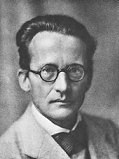| VIAS Encyclopedia provides a collection of tables and definitions commonly needed in science and engineering. |

|

Home  Science History Science History  Biographies Biographies  Erwin Schrödinger Erwin Schrödinger |
|||
| See also: Max Planck, Niels Bohr, Albert Einstein | |||






|
|||
Erwin Schrödinger
Erwin Schrödinger was born on August 12, 1887, in Vienna. First he received private instruction; from 1898 to 1906 he attended the public academic high school in Vienna, where he was usually the top student. He loved the theater and literature, as well as applied arts and was interested in Greek philosophy. In 1906, he started to study physics and mathematics at the University of Vienna. He was also interested in chemistry, meteorology and astronomy. After graduation in 1910 and one-year military service, he was an assistant at the Viennese Institute for Radium Research. In 1914, he habilitated at the University of Vienna and in 1915 joined the military as an artillery officer on the Italian front. After short stays in Jena, Stuttgart and Breslau, he had the position as a full professor for theoretical physics (following Albert Einstein) from 1921. Then in 1927, he received a position in Berlin as Max Planck's successor. In 1933, Schrödinger voluntarily left Germany. In December, 1933, he received the Nobel Prize for Physics. After a short stay in Oxford, he accepted a teaching chair in 1936 in Graz. After the annexation of Austria to the German Reich, he fled in 1938 through Rome (Fermi) and through Belgium to Dublin, where he led as one of the directors of the Institute for Advanced Studies. In 1956, he returned via Alpbach in Tirol to Vienna, where he died on January 4, 1961.
|
|||
Home  Science History Science History  Biographies Biographies  Erwin Schrödinger Erwin Schrödinger |
|||
Last Update: 2010-12-15


